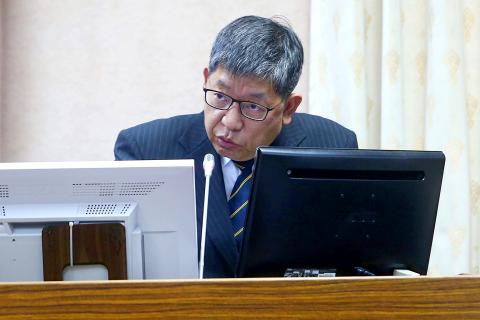A legislative committee yesterday passed a resolution urging the government to explore all diplomatic channels to free Taiwanese human rights advocate Lee Ming-che (李明哲), who is being detained in China.
The Foreign Affairs and National Defense Committee passed a motion asking the Ministry of Foreign Affairs and other agencies to lobby US and European politicians, and seek the help of non-governmental organizations (NGOs).
Lee went missing on March 19. Ten days later, Beijing said he had been detained for engaging in activities “endangering national security,” but did not reveal where he was being held.

Photo: CNA
Democratic Progressive Party (DPP) Legislator Wang Ding-yu (王定宇), who proposed the motion, asked if the ministry had sought international assistance in the case.
“No such efforts have been made,” a ministry official said.
“It is the government’s duty to explore all possible means to free its citizens, but the ministry has done nothing 24 days after [Lee’s detention]. What is the use of a government that cannot protect its citizens?” Wang said.
He asked the ministry to seek assistance from members of the US Congressional Taiwan Caucus and the US Department of State’s Bureau of East Asian and Pacific Affairs to pressure Beijing to release Lee.
Wang asked Mainland Affairs Council Deputy Minister Lin Cheng-yi (林正義) if the council had drafted any countermeasures after China ignored the cross-strait judicial agreement and illegally detained a Taiwanese.
Lin said only that the council has “a variety of measures in place.”
New Power Party Legislator Freddy Lim (林昶佐) questioned whether the nation has improved its response system since the arrest of Taiwanese Falun Gong practitioner Bruce Chung (鍾鼎邦) by Chinese security forces in 2012.
Lim said the council should set up a task force to plan and implement countermeasures should Taiwanese “disappear” in China, such as launching a global rescue campaign with the help of NGOs.
“China has trashed the Cross-Strait Joint Crime-Fighting and Judicial Mutual Assistance Agreement (海峽兩岸共同打擊犯罪及司法互助協議) in Lee’s case. The council has to take action, instead of simply making statements, or China will be emboldened [by Taiwan’s inaction],” DPP Legislator Tsai Shih-ying (蔡適應) said.
The government informed Beijing of the arrest of Chinese citizen Zhou Hongxu (周泓旭), who was accused of forming a spy ring in Taiwan, while ensuring Zhou’s legal rights in accordance with the agreement, but China has yet to reveal why Lee was arrested and where he is being held, Tsai said.
Separately, at a meeting of the DPP Central Standing Committee, President Tsai Ing-wen (蔡英文) said the government was making every effort to seek Lee’s release.

EUROPEAN TARGETS: The planned Munich center would support TSMC’s European customers to design high-performance, energy-efficient chips, an executive said Taiwan Semiconductor Manufacturing Co (TSMC, 台積電), the world’s largest contract chipmaker, yesterday said that it plans to launch a new research-and-development (R&D) center in Munich, Germany, next quarter to assist customers with chip design. TSMC Europe president Paul de Bot made the announcement during a technology symposium in Amsterdam on Tuesday, the chipmaker said. The new Munich center would be the firm’s first chip designing center in Europe, it said. The chipmaker has set up a major R&D center at its base of operations in Hsinchu and plans to create a new one in the US to provide services for major US customers,

The Ministry of Transportation and Communications yesterday said that it would redesign the written portion of the driver’s license exam to make it more rigorous. “We hope that the exam can assess drivers’ understanding of traffic rules, particularly those who take the driver’s license test for the first time. In the past, drivers only needed to cram a book of test questions to pass the written exam,” Minister of Transportation and Communications Chen Shih-kai (陳世凱) told a news conference at the Taoyuan Motor Vehicle Office. “In the future, they would not be able to pass the test unless they study traffic regulations

‘A SURVIVAL QUESTION’: US officials have been urging the opposition KMT and TPP not to block defense spending, especially the special defense budget, an official said The US plans to ramp up weapons sales to Taiwan to a level exceeding US President Donald Trump’s first term as part of an effort to deter China as it intensifies military pressure on the nation, two US officials said on condition of anonymity. If US arms sales do accelerate, it could ease worries about the extent of Trump’s commitment to Taiwan. It would also add new friction to the tense US-China relationship. The officials said they expect US approvals for weapons sales to Taiwan over the next four years to surpass those in Trump’s first term, with one of them saying

‘COMING MENACINGLY’: The CDC advised wearing a mask when visiting hospitals or long-term care centers, on public transportation and in crowded indoor venues Hospital visits for COVID-19 last week increased by 113 percent to 41,402, the Centers for Disease Control (CDC) said yesterday, as it encouraged people to wear a mask in three public settings to prevent infection. CDC Epidemic Intelligence Center Deputy Director Lee Chia-lin (李佳琳) said weekly hospital visits for COVID-19 have been increasing for seven consecutive weeks, and 102 severe COVID-19 cases and 19 deaths were confirmed last week, both the highest weekly numbers this year. CDC physician Lee Tsung-han (李宗翰) said the youngest person hospitalized due to the disease this year was reported last week, a one-month-old baby, who does not